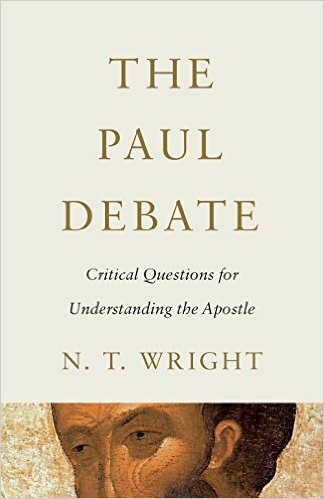N.T. Wright’s Newest Release: The Paul Debate
 N. T. Wright, The Paul Debate: Critical Questions for Understanding the Apostle (Baylor University Press, 2015), 122 pages, ISBN 9781481304177.
N. T. Wright, The Paul Debate: Critical Questions for Understanding the Apostle (Baylor University Press, 2015), 122 pages, ISBN 9781481304177.
Theologians and pastors alike have come to expect that, as each calendar year turns, Dr. Tom (N.T. Wright) will publish some new work. Such has happened just this week with the release of his most recent book now available, The Paul Debate: Critical Questions for Understanding the Apostle.
It’s not as if Wright hasn’t already written plenty on the topic – he has, perhaps, published more on Pauline studies than any other over the past three decades. Some of his greatest works include What Saint Paul Really Said: Was Paul of Tarsus the Real Founder of Christianity?, Paul: In Fresh Perspectives, and Justification: God’s Plan & Paul’s Vision. Even more, his massive 1700-page tome, Paul and the Faithfulness of God came out only two years ago. It was volume 4 of his Christian Origins and the Question of God. He has literally racked up thousand and thousands of published pages on the theme of Paul’s theology as found in the New Testament.
Most will know by now, but Wright steps to the plate as a champion for what has been titled the “new perspective on Paul” (NPP), which is in contradistinction to a normal evangelical reading of Paul’s letters, especially his letters to the churches in Galatia and Rome. Following in the vein of folk like E.P. Sanders and James Dunn, Wright argues that the NPP paradigm offers a better grounding in the first-century setting of Paul. The normal Protestant and evangelical readings of Scripture, NPP advocates charge, is to readily run through the lens of a perspective that came along later during the 16th century Reformation.
As expected, with the release of Paul and the Faithfulness of God, much scrutinization of the magnum opus followed, both criticism and praise. In an effort to briefly respond to the reviews (the book’s content weighs in at a mere 107 pages), and probably more the critical responses, Wright has offered this new Baylor Press publication, The Paul Debate. In all, the book serves as a succinct summary of his own insights into the new perspective on Paul.
In particular, the book is broken into five chapters of similar length that address particular criticisms. As he outlines in the Preface:
“The five chapters represent a response to the five most questioned elements in my book [Paul and the Faithfulness of God]… The first chapter thus takes up the question of Paul’s theological coherence, particularly the way in which his Jewish context, and the story about Israel he inherited, interacted with what he came to believe about Jesus, a christological story. Chapter 2 follows on by tackling the debate over the background, origin, and implications of Paul’s Christology. The third chapter addresses the questions of covenant and cosmos, narrative and apocalyptic. Chapter 4 focuses on the debate over Paul’s view of who constitutes the people of God; this chapter also addresses the question of whether justification belongs to Paul’s soteriology or to his ecclesiology, or somehow to both. The final chapter then traces debates about method, both Paul’s and ours, as well as questions of discovery and presentation, again, both Paul’s and ours.” (ix-x)
To read even this summary of the book’s themes easily reminds us that the present work is more suitable to seminarians than a popular audience. To break it down, consider these points being addressed in each chapter.
Chapter 1 – Was Paul simply a Jew who knew Jesus as Messiah or did he carry a more Hellenistic, Greek perspective with only very little Jewish thought remaining? Or, was Paul deeply rooted in his Jewish thinking, but was one who had had his paradigm renewed in the new framework of Jesus as God’s Messiah? Wright is convinced Paul was as Jewish as they come, yet, thinking like the Messiah meant “bringing a whole world of Jewish thinking into a new focus, a new frame, because the Messiah himself, so Paul believed, had brought the whole life of God’s ancient people into a new focus, a new frame.” (p11)
Chapter 2 – This chapter flows on from the first in that Wright gets into the nitty gritty of the Jewish framework on which Paul built his renewed theology. Whereas concepts such as the hypostatic union and Trinity were defined a few centuries later in church history, all in an effort to support the view of Jesus’ divinity, Paul had his own Jewish way of identifying Jesus, the Messiah, with the God of Israel. The divine identity lined up quite well with the way the Hebrew Scriptures particularly spoke about Yahweh and his activity.
Category: Biblical Studies, Fall 2015


